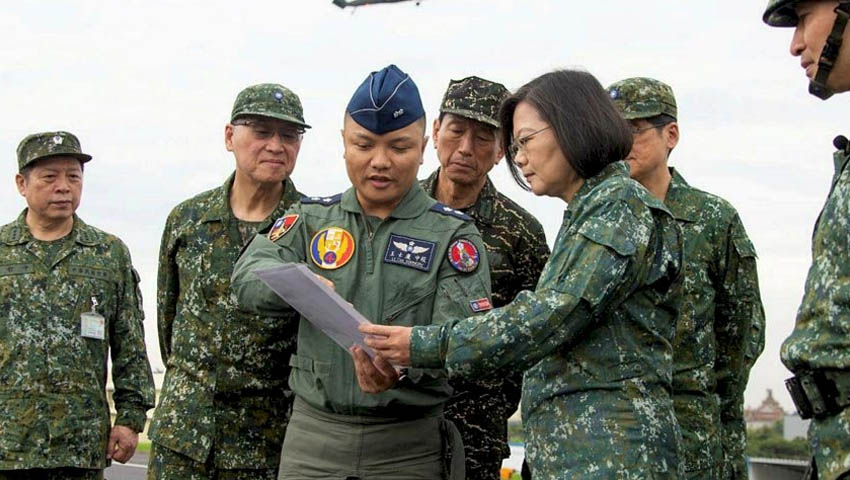The US has doubled down on its support for Taiwan, approving over $1 billion in new arms sales, but will this latest action provoke further aggression from Beijing?
Late last year, the US State Department approved over US$2.5 billion ($3.38 billion) in arms sales to Taipei, which included 135 Boeing-built SLAM-ER missiles, four weapons-ready General Atomics-built MQ-9B SkyGuardian drones, 11 Lockheed Martin-built High Mobility Artillery Rocket Systems (HIMARS), and six Raytheon-built MS-110 Recce Pods.
The deals, greenlit under the former Trump administration, triggered backlash from the Chinese Communist Party (CCP) leadership in Beijing, which later announced sanctions against US defence contractors involved in the sales.
The CCP accused the US of “severely violating” its ‘One China’ policy and the three China-US joint communiqués, adding that the sales “seriously undermine” China's sovereignty and security interests.
“China firmly opposes and strongly condemns it,” China’s Foreign Ministry spokesman, Zhao Lijian, said at the time.
“Once again, we urge the United States to strictly fulfill its commitment to the one-China principle and observe the three China-US joint communiqués, and stop selling weapons to Taiwan or having any military ties with it.
“We will continue taking necessary measures to safeguard national sovereignty and security interests.”
Subsequently, China’s People’s Liberation Army (PLA) ramped up military flyovers across Taiwan’s air defence identification zone (ADIZ), perhaps in retaliation for burgeoning Western support.
However, these flyovers only legitimised Taipei’s urgent push to modernise its military.
This modernisation effort has continued through the course of 2021, with the US showing no sign winding down arms support under the Biden administration.
Just this week, the US approved Taiwan’s request to purchase 40 BAE Systems-built 155mm M109A6 Paladin Medium Self-Propelled Howitzer Systems for an estimated US$750 million ($1 billion).
The order also includes:
- 20 M992A2 Field Artillery Ammunition Support Vehicles (FAASV);
- one Advanced Field Artillery Tactical Data System (AFATDS);
- five M88A2 Hercules vehicles;
- five M2 Chrysler Mount .50 calibre machine guns;
- 1,698 multi-option, Precision Guidance Kits (PGK); and
- Associated training and technical support services.
In a statement, the Defense Security Cooperation Agency (DSCA) reaffirmed support for Taiwan’s procurement strategy.
“This proposed sale is consistent with US law and policy as expressed in Public Law 96-8,” the DSCA noted.
“This proposed sale serves US national, economic, and security interests by supporting the recipient’s continuing efforts to modernise its armed forces and to maintain a credible defensive capability.
“The proposed sale will help improve the security of the recipient and assist in maintaining political stability, military balance, economic and progress in the region.”
The deal comes off the back of recent remarks from US Secretary of Defense Lloyd Austin who, in an address to Singapore’s International Institute for Strategic Studies, lambasted Beijing’s indifference to international law and the sovereignty of smaller neighbouring states.
Secretary Austin assured regional partners of the US’ support in the event of a conflict, but called on China to sit at the negotiation table and resolve dispute diplomatically.
“We will not flinch when our interests are threatened,” he said. “Yet we do not seek confrontation.”
He added, “So let me be clear — as Secretary, I am committed to pursuing a constructive, stable relationship with China ... including stronger crisis communications with the People's Liberation Army.”
Therein lies a destructive geopolitical cycle.
Chinese aggression has unsurprisingly prompted arms proliferation from wary neighbours, particularly Taiwan.
As a result, a riled, emboldened Beijing would be less inclined to heed Austin’s plea for peaceful dialogue.
But given Beijing’s transparent push to capitalise on its relatively new-found strength by bullying the international community into submission, it’s likely that a return to the negotiating table was never on the cards.
An unaccountable regime with little respect for its own people is unlikely to extend an olive branch to its foreign competitors.
Get involved with the discussion and let us know your thoughts on Australia’s future role and position in the Indo-Pacific region and what you would like to see from Australia's political leaders in terms of partisan and bipartisan agenda setting in the comments section below, or get in touch with








